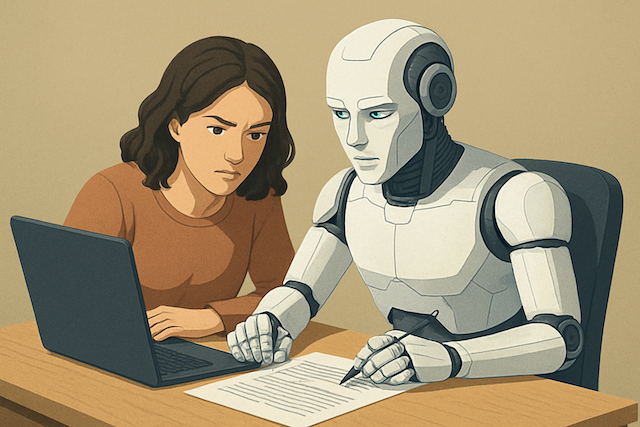
The essay looked impressive for about ten seconds. Then I saw the em dashes scattered throughout like confetti. One paragraph peppered with language about her aversion to raw oysters; the next professed undying love for it. The contradictions weren’t the messy kind that reveal a complex person; they were the algorithmic kind that show someone hit “generate” and walked away.
She didn’t tell me at first. After three rounds of revision, circling the same hollow paragraphs, she finally confessed: she’d fed our brainstorming notes into ChatGPT and submitted whatever came out. She hadn’t even read it carefully before sending it to me for review.
The tool was new. The struggle wasn’t. I’ve been helping teenagers write college essays long enough to have read thousands of first drafts: some brilliant, most terrible, all unmistakably human. There’s a particular kind of chaos that manifests when a seventeen-year-old writes about themselves full of false starts, overwrought metaphors, and that glorious moment three paragraphs in when they finally discover what they’re really trying to say.
I still love that mess, the raw, unpolished expression that reveals who a student really is. But now there’s a new layer to my work: teaching students who are putting in the hard work how to prove that the writing is genuinely their own.
The Authenticity Tax
Something fundamental shifted in 2025. For the first time in my career, I’m not only teaching students how to write; I’m teaching them how to demonstrate their authorship. We’ve moved from “tell your story” to “prove this story is yours.”
Universities like Brown have restricted the use of AI tools in the application process. Detection software has grown sharper. And my students begin every call with the same anxious question: “Will this sound like I used ChatGPT?”
The irony isn’t lost on me. I just launched an AI coaching platform. But what keeps me up at night isn’t the threat of detection. It’s the certainty of erosion. The dulling of the creativity and natural instincts that add the texture of lived experience to an essay, the crooked edges of thought that make a story human.
More troubling still, they’re skipping the part that matters most: the self-discovery that happens when you struggle to put your life into words. That friction—the difficulty of articulating who you are—is where students build confidence in their own thinking. When AI does that work for them, they lose more than authenticity; they also lose the human touch. They lose the chance to know themselves better.
What “Authentic” Really Means
This raises a crucial question: what exactly are we asking students to preserve? “Authenticity” is often used as if we all agree on its meaning. We don’t.
When admissions officers ask for an authentic voice, they don’t want rambling or raw confession. They want to sense a real person behind the words: someone who notices small details, reflects with nuance, and has something particular to say. The best essays show rather than tell. They don’t announce, “I learned resilience.” They describe late-night practices, missed shots, and the quiet decision to show up again.
That’s why revision matters. Draft after draft, students chip away at what’s generic to reveal what’s true and meaningful. This process isn’t just about better writing. It’s about better thinking and honest reflection. Students discover what they actually believe, what moments shaped them, and what opinions matter enough to defend in words. Sometimes the spark lives in the tiny details: a morning commute with a parent, a houseplant that multiplied from one succulent to ten, the smell of a grandmother’s kitchen. Those specifics make the writing feel alive.
But more importantly, finding those details builds something lasting: confidence in their own observations, trust in their own voice. When a student finally lands on a magic sentence (one that captures exactly what they mean), they’re not just writing. They’re claiming ownership of their own story.
AI can simulate emotion, but not your experience of it.
From Students to the Corporate World
The struggle to maintain an authentic voice isn’t confined to college applications. College essays are a microcosm of a larger reckoning. The same flattening that makes student writing sound generic is creeping into corporate communication, marketing copy, and even customer service scripts.
That’s the real danger of AI: not that it replaces creativity, but that it dulls it. We start optimizing for what works on average and forget what works spectacularly. We mistake speed for substance. We build a world where everything sounds competent, but nothing feels memorable.
The organizations that thrive will be those that resist that flattening. Their work will stand out because it beats with a human pulse: specific, textured, and unmistakably theirs.
What We Actually Need
So how do we resist? How do we use these powerful tools without losing what makes us human? That’s why I built College EssAI. Not because AI is the enemy, but because we’ve been asking the wrong question. The question isn’t “Should we use AI?” It’s “How can we protect the capacity to think critically and creatively for ourselves while using these tools wisely?”
In my practice, that means treating AI as a sparring partner, not a ghostwriter. It sparks deeper thinking. When used this way, AI isn’t a shortcut. It’s a conversation partner who won’t let you off the hook until you find what you genuinely want to say. The goal isn’t just a better essay. It’s a more confident student, one who’s done the hard work of understanding themselves and can articulate it clearly. That confidence carries far beyond college applications.
What’s at Stake
The stakes extend far beyond college admissions. If we can’t preserve authentic thought in a 650-word essay about ourselves, how can we maintain it in medicine, law, journalism, or anywhere human judgment matters?
The answer isn’t banning the tools. It’s building better ones—tools that sharpen reflection, not imitation. It’s teaching students that shortcuts are costly, especially when what’s being cut is the process of discovering who they are and finding the words to express it.
Because here’s what I’ve learned after two decades: the college essay is never really about the goal of admission. It’s about a seventeen-year-old sitting with the question “Who am I?” and refusing to settle for someone else’s answer. It’s about building the confidence to trust their own thinking, to value their own experiences, to believe they have something worth saying.
I want students to leave my program as better writers and thinkers, who are more confident in their own ideas and their ability to articulate them. Who go deep. Who finds joy in self-discovery. Who remember that the most human stories seek to capture the truth, not aim for perfection.
Twenty years ago, my job was to help teenagers find their voice. Today, it’s to help them keep it. The stakes have never been higher, and the work has never been more critical. Because in a world where any machine can string together competent sentences, the only thing worth writing (and worth being) is something unmistakably, irreplaceably you.
About Stacey Brook
Stacey Brook is the founder and chief advisor of College Essay Advisors (CEA), with publications in outlets such as The New Yorker, Teen Vogue, and Condé Nast Traveler. She and her CEA team have helped students share their unique stories with college admissions for over 20 years. Based in New York City, she enjoys exploring local cuisine in her free time.




